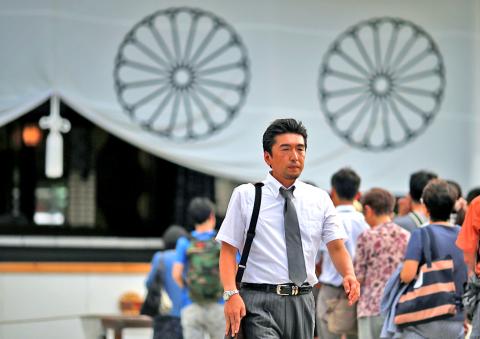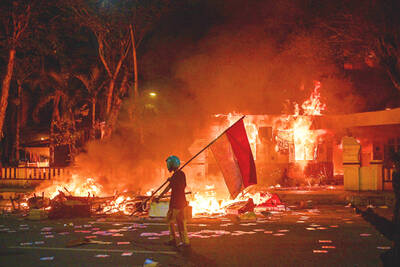To Hidetoshi Tojo, his great-grandfather is a man in a black-and-white documentary film he saw about 30 years ago.
In one scene that he watched, Hideki Tojo — a bald, bespectacled man with a mustache — is sitting at a war crimes tribunal in Tokyo when he suddenly gets a slap in the head from behind by another defendant. The sound of the smack pierces through the courtroom, yet Hideki Tojo just turns his head around and grins.
“That was your great-grandfather,” Hidetoshi Tojo’s mother told him after he watched the scene.

Photo: AP
Hideki Tojo, an executed Class-A war criminal, was Japan’s prime minister during much of World War II. He was behind the attack on Pearl Harbor, and was blamed for prolonging the war, resulting in the US atomic bombings of Hiroshima and Nagasaki.
The younger Tojo, now a 42-year-old entrepreneur, was a fourth-grader when he saw the film. As a child, people often referred to him as “Hideki Tojo’s great-grandson,” and not by his own name. He did not like the tone of their voice, but his parents told him to just keep his mouth shut and cope.
Decades later, Japan and its Asian neighbors are still seeking closure on their wartime past. As Japan marked the 70th anniversary of the country’s Aug. 15, 1945, surrender that ended World War II, two of the descendants of Class-A war criminals interviewed separately made gestures toward reconciliation.
For Hidetoshi Tojo, facing Japan’s wartime history involved a process of accepting his roots.
“I carry an extreme label: a descendant of the heinous villain,” he said.
He said he used to wish he could reject his identity. He also said he did not enjoy Japanese history classes when he was in school, and did not like the attention he got. However, more recently, as eyewitnesses of the war get old and memories fade, Hidetoshi Tojo has changed his mind.
He now thinks there is a role he could play because of who he is, and is seeking ways to help Japan and its wartime enemies overcome the past and reconcile. He has reached out to Clifton Truman Daniel, grandson of wartime US President Harry Truman, to propose joint projects such as public talks.
He said that he briefly spoke with Daniel via video conference and that he wants to get to know him better because there might be something they can share.
While Hidetoshi Tojo said he has no intention of trying to justify his great-grandfather’s wrongdoings, he thinks Daniel and he could share their feelings about the difficulties of being members of families with such huge historical legacies.
“Of course, unlike me, [Daniel] is on the victor’s side, but I wonder how he feels about being the grandson of someone who dropped atomic bombs on Hiroshima and Nagasaki,” Hidetoshi Tojo said.
Just like he thinks about his great-grandfather’s wartime responsibility, he said Daniel might be going through a similar process trying to come to terms with his grandfather’s decision.
Daniel has been involved in anti-nuclear activity since being inspired by the story of Sadako and her thousand cranes in a book his son brought home from school.
“I’m hoping perhaps we can convey a forward-looking message together,” Hidetoshi Tojo said of Daniel.
Former Japanese diplomat Kazuhiko Togo has done his own soul-searching in reconciling and accepting the judgment of history on his grandfather, Shigenori Togo, who twice served as Japan’s foreign minister. He was part of the Tojo Cabinet that started the war, and the Kantaro Suzuki Cabinet that ended it.
Shigenori Togo, known for opposing the war and for his efforts to end it, was sentenced to 20 years and died in prison when his grandson was only five.
“I cannot share the view that he is a representative of the aggressors’ position, but that is how history concluded, and I think I have to accept this fact,” Kazuhiko Togo said. “That was the verdict pronounced by the Allies, not by us. Then what is our own judgement? That became my task.”
Kazuhiko Togo followed in his grandfather’s footsteps, joining the foreign ministry as a diplomat. Since retiring, he has dedicated his time to researching Asian historical issues. Last month, he published a book titled Diplomacy in Crisis, in which he proposed a road map to resolving the problems of the Yasukuni Shrine, which honors war criminals among other war dead.
Japanese Prime Minister Shinzo Abe’s historical views, seen by many as revisionist, and his 2013 visit to the shrine, viewed as a symbol of Japan’s militaristic past, have stalled Japan’s relationships with China and South Korea.
Kazuhiko Togo, a believer in the power of diplomacy, suggests that the 14 Class-A criminals honored at the shrine, including his grandfather, be temporarily “de-shrined” until a better option is found. Their names were added to the shrine in 1978 after the government decided they were not criminals under Japanese law.
“Just removing it as today’s thorniest political issue — that is important,” he said. “I think it is important for us to resolve this very difficult issue of soul-searching inside Japan. At the same time, it is very important to resolve diplomatically. Then Yasukuni will be off the agenda.”

Australia has announced an agreement with the tiny Pacific nation Nauru enabling it to send hundreds of immigrants to the barren island. The deal affects more than 220 immigrants in Australia, including some convicted of serious crimes. Australian Minister of Home Affairs Tony Burke signed the memorandum of understanding on a visit to Nauru, the government said in a statement on Friday. “It contains undertakings for the proper treatment and long-term residence of people who have no legal right to stay in Australia, to be received in Nauru,” it said. “Australia will provide funding to underpin this arrangement and support Nauru’s long-term economic

‘NEO-NAZIS’: A minister described the rally as ‘spreading hate’ and ‘dividing our communities,’ adding that it had been organized and promoted by far-right groups Thousands of Australians joined anti-immigration rallies across the country yesterday that the center-left government condemned, saying they sought to spread hate and were linked to neo-Nazis. “March for Australia” rallies against immigration were held in Sydney, and other state capitals and regional centers, according to the group’s Web site. “Mass migration has torn at the bonds that held our communities together,” the Web site said. The group posted on X on Saturday that the rallies aimed to do “what the mainstream politicians never have the courage to do: demand an end to mass immigration.” The group also said it was concerned about culture,

ANGER: Unrest worsened after a taxi driver was killed by a police vehicle on Thursday, as protesters set alight government buildings across the nation Protests worsened overnight across major cities of Indonesia, far beyond the capital, Jakarta, as demonstrators defied Indonesian President Prabowo Subianto’s call for calm. The most serious unrest was seen in the eastern city of Makassar, while protests also unfolded in Bandung, Surabaya, Solo and Yogyakarta. By yesterday morning, crowds had dispersed in Jakarta. Troops patrolled the streets with tactical vehicles and helped civilians clear trash, although smoke was still rising in various protest sites. Three people died and five were injured in Makassar when protesters set fire to the regional parliament building during a plenary session on Friday evening, according to

CRACKDOWN: The Indonesian president vowed to clamp down on ‘treason and terrorism,’ while acceding to some protest demands to revoke lawmaker benefits Protests in Indonesia over rising living costs and inequality intensified overnight, prompting Indonesian President Prabowo Subianto to cancel a planned trip to China, while demonstrators reportedly targeted the homes of the finance minister and several lawmakers. Rioters entered Indonesian Minister of Finance Sri Mulyani Indrawati’s residence near Jakarta early yesterday, but were repelled by armed forces personnel, Kompas reported. Items were taken from the homes of lawmaker Ahmad Sahroni and two others, according to Detik.com. The reports of looting could not be independently verified, and the finance ministry has not responded to requests for comment. The protests were sparked by outrage over